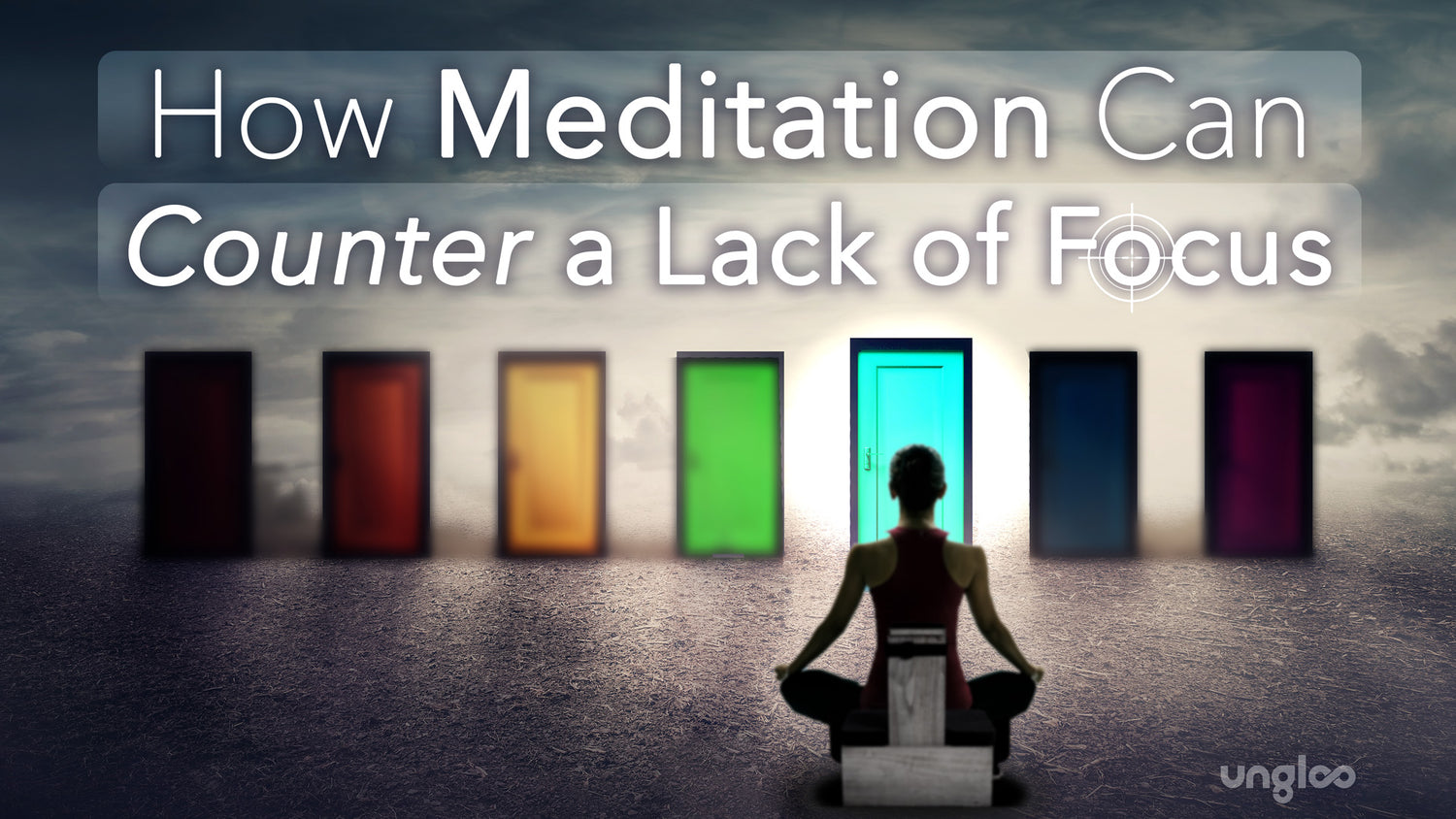A study found that people have wandering minds 47% of the time, which means they are not entirely focused or paying attention to what is in front of them. So, what are the consequences of a wandering mind? One is a lack of brain focus, which you can manage with meditation.
There are many reasons why people cannot focus. Factors include worrying about the future or past, mental health disorders, specific physical health issues, lack of sleep, stress, and diet. But one of the main reasons is being unable to be present in the moment, which meditation for focus can change.
Around 500 million people meditate worldwide, and that number continues to grow as people realize the many benefits of meditation, including improving your brain focus. If you are interested in how to stay focused with meditation, this post is for you. Read on for everything you need to know about meditation for focus.
How Meditation Works
There are a variety of ways to meditate, which offer a variety of benefits. You do not have to stick with the lotus position without meditation supports; you can find what type of meditation works for you.
People choose to meditate for different lengths of time depending on the practice they follow; however, consistency is vital to reap the benefits of meditation.
Meditation for Focus Techniques
While all types of meditation help you focus, you can also try focus meditation. It makes you focus your attention fully on something as a way to stay present, unlike some forms of meditation that aim to empty the mind for presence.
Some of the main goals of meditation for focus include:
- Directing your attention to the focus point, such as a sensation or object
- Observing when your mind wanders, and you have distractions
- Being able to disengage from distractions and return to the focus point
- Recognizing distraction as a thought
You can identify the distraction as soon as you notice your mind wandering.
There is no need to judge the distraction, as that puts more energy and focus on the distraction. Instead, you identify the distraction and then return your attention to your focus point.
Your focal point could be a sound, object, or sensation. It usually is sensory stimuli or your breath. This meditation is popular because you do not need an instructor, just your own equipment to be comfortable and have some preparation.
You begin by selecting your focus point, finding a comfortable position, and beginning to deepen your breath. You can scan your body for areas of tension and ensure you are relaxed. You then focus on your chosen point without thinking about it, simply experiencing it.
You then focus on returning to your focus point whenever you find your mind wandering. Do not judge any wandering; instead, give gratitude for noticing and return to experiencing your focus point.
Benefits of Meditation for Brain Focus
There is a reason why humans have practiced meditation for centuries, including references to meditation from some of the oldest written records in India, dating from 1500 BC. It is because meditation works. If you are looking for easily distracted remedies and how to focus, then meditation could be for you.
Reduces Activity in Monkey Mind
There are many ways that meditation impacts the brain, including reducing activity in the 'me center' of the brain, which is also known as the medial prefrontal cortex.
This part of the brain is responsible for complex thinking, personality, attention, processing information about your experiences, and how to relate to yourself. It is the default mode network (DNM), which is why it is called the monkey mind, too, as it is where you experience strong reactions during specific experiences and sensations.
When you meditate, you can reduce the strength of this neural connection and quieten the impact of the 'Me Center.' When your mind starts to wander, you will have more connections to recognize it sooner and return to the center with better focus.
Improves Attention and Concentration
When considering how to focus, working on your concentration is key. We live in a world of more distractions than ever, with some studies suggesting the average attention span is as little as eight seconds. Stopping and allowing yourself time to meditate can help you re-center and focus once more.
Focus meditation especially exercises your mind to focus on a specific point. It improves your perception, which in turn helps you sustain attention. Focusing on one point without being distracted can be extremely challenging, so consistent meditation practice enables you to improve this skill.
Plus, it will also help improve your attention and concentration in everyday life. You will be quicker to recognize when your mind is wandering and be able to come back to your center.
Reduce Anxiety and Depression
Many people meditate because it reduces stress, which is one of the main reasons people struggle to focus. Stress and mental health difficulties such as anxiety or depression make it hard to detach yourself from your thoughts. You are constantly thinking about the past or future, which distracts you from being fully in the present moment.
Meditation helps you observe your thoughts and disentangle them from there. It helps trigger the body's relaxation response, also shrinking the amygdala, which enables you to respond instead of reacting to stressful situations.
Anxiety often comes from the struggle to regulate emotional responses to perceived threats. There are many reasons why meditation can help reduce anxiety and depression systems to help you focus. But one reason is that meditation can activate the anterior cingulate cortex, which helps govern thinking and emotion.
Recognizing and Disengaging from Distractions
One of the main ways meditation helps improve your brain focus is to help you recognize you are not your thoughts, which is one of the best ways to learn how to focus. (And, as it turns out, it helps with not getting pulled into other people’s drama.) They are simply energies and emotions flowing through you, which meditation teaches you to observe without judgment.
Meditation practice improves your ability to recognize when your mind is wandering and have techniques to disengage from distractions. You can then continue to focus on the present moment without getting lost in a thought stream. Simply repeat to yourself, “I am not my thoughts” when you get triggered or distracted and you’ll start to find relief.
Manage Time
It often feels more productive to multi-task, but are you able to focus without being distracted by the other things you need to do? One reason people hesitate to meditate is that they worry they do not have the time, which is specifically why you should meditate.
When you return to the present moment, you are not spending all your time engaged in your thoughts and letting life pass by in front of you. Slowing down and working on your focus will help you approach tasks more efficiently without so many distractions.
Memory Recall
Meditation helps improve blood flow to the brain, which helps activate different areas, including memory recall. Studies have found that meditation helps various cognitive processes. Subjects were able to filter distractions and be more productive.
One of the main reasons why was their improved memory recall, which also means you can focus better and carry out tasks efficiently. The main reason for enhanced memory recall is that meditation can help increase cortical thickness in the hippocampus, which controls your learning and memory.
Reduce Distraction Triggers
There are many reasons why people get distracted and cannot focus. This includes addiction to substances, which can trigger a lack of focus.
Meditation also affects the self-control centers of your brain, which can help them disconnect from cravings and recognize triggers.
Meditation can help you learn how to ride out the craving and fully experience the sensation. You can then recognize that cravings do not mean the associated behavior has to be fulfilled.
Being able to recognize distraction triggers and avoid the harmful behavior they can lead to helps you stay focused in the present moment. Meditation can also help with technology use, food cravings, and other addictive stimuli in your life.
Change Subjective Perceptions
Do you recognize why you get distracted but are unsure how to break the pattern? Meditation gives you tools to focus on the moment, such as returning to your breath or a specific focal point.
Meditation helps you stay in observer mode without getting attached to thoughts that arise. As your emotional well being improves, so will your perceptions of things. Meditation can help break thought patterns and help you stay present with new perceptions.
Tips for Meditation and Brain Focus
There are many ways that meditation can help your brain focus. However, it can feel overwhelming to know where to begin. So, how can you utilize focus meditation?
One of the best ways is to set up a time and space to meditate, which helps make it a routine. You do not have to be in the lotus position; you can find what works for you.
Are you looking to start meditation for focus? Avoid being distracted by being uncomfortable when meditating. Check out our range of products to help make meditation as comfortable as possible.


